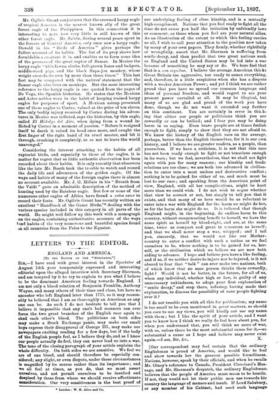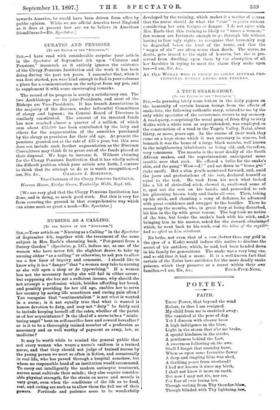LETTERS TO THE EDITOR.
ENGLAND AND AMERICA.
[TO THE EDITOR Or THY " SPECTATOR."] have read with great interest in the Spectator of August 14th your temperately expressed and interesting editorial upon the alleged interview with Secretary Sherman, and am tempted by it to try to explain to you what I believe to be the dominant American feeling towards England. I am not only a blood relation of Benjamin Franklin, Anthony Wayne, and many others of their time and class, but have no ancestor who left England later than 1715, so it may reason- ably be believed that I am as thoroughly an American as any one can be. As such I do not hesitate to tell you that I believe it impossible that any one's bad manners can ever force the two great branches of the English race again to shed each other's blood. The politicians on both sides may make a Stock Exchange panic, may make our small boys express their disapproval of George III., may make our newspapers exciting reading for a• few days, but if the body of the English people feel, as I believe they do, and as I know our people actually do feel, they can never lead us into a war. The tone of the closing paragraph of your article explains the whole difficulty. On both sides we are sensitive. We feel we are of one blood, and should therefore be especially con- sidered; any slight, or even dispute, under these circumstances is magnified by its source rather than its importance ; and we all feel at times, as you do, that we must assert ourselves, and not permit ourselves to be insulted and despised by those from whom we should receive affectionate consideration. Our very sensitiveness is the best proof of
• London : W. H. Allen and Co.
our underlying feeling of close kinship, and is a mutually high compliment. Nations that you feel ready to fight all the time do not cause you half the irritation by unfriendly laws or comment, as those whom you feel are your natural allies. As an illustration of the extent to which this feeling carries us all, I wish to call your attention to the position now taken by many of your own papers. They firmly, whether rightfully or wrongfully, assert that Mr. Sherman is suffering from senile decay, and then predict that two great nations such as England and the 'United States may be led into a war because of something he may say or do. We here feel that that is a non sequitur. I believe the average American thinks Great Britain too aggressive, too ready to annex everything, and, therefore, is a little suspicious when she has a dispute with a weaker American Power; and yet I think we are rather proud that you have so spread our common language and• ideas of personal freedom, and would regret to see your present power curtailed at all. It may be illogical, but many of us are glad and proud of the work you have done, though we do not want it extended any further on this continent. You are certainly in error in thiLk- ing that either our people or politicians think you are cowardly or can be bullied; and I fear you may be doing- harm in so saying. Even brave people are at times foolish enough to fight, simply to show that they are not afraid to. We know the history of the English race on the average, perhaps, better than the English themselves, for it is our own history, and I believe we are greater readers, as a people, than yourselves. If we have a criticism, it is not that this race has not been ready enough to fight or not tenacious enough in its wars ; but we feel, nevertheless, that we shall not fight again with you for many reasons ; our kinship and trade relations are too close; we are both too advanced in civilisa- tion to enter into a most useless and destructive conflict;. nothing is to be gained for either of us, and much must be lost to our race ; and speaking from the American point of view, England, with all her complications, might be hurt more than we could wish. I do not wish to argue whether- that view be correct or not, but simply to tell you that it exists, and that many of us here would be as reluctant to enter into a war with England for the harm we might do her,. as for the harm she might do us. It is believed that though England might, in the beginning. do endless harm to this country, without compensating benefit to herself, we have the same spirit as herself by blood-right, and are, at the same time, twice as compact and great in resources as herself; and that we shall never stop a war, whipped ; and I tell you, sincerely, that we would not like our Mother- country to enter a conflict with such a nation as we feel ourselves to be, where nothing is to be gained for us, her- self, or the civilisation which we believe we are now both aiding to advance. I hope and believe you have a like feeling,. and if so, if we neither desire to injure nor be injured, is it not• absurd to fear that " talk " can ever make two nations, both of which know that no sane person thinks them cowardly,. fight ? Would it not be better, in the future, for all of us, when any individual, whether high or low, is guilty of any unnecessary unkindness, to adopt your first explanation of " senile decay," and stop there, refusing, having made that explanation, to discuss the possibility of sane people fighting over it ?
I do not trouble you with all this for publication; my name- is too small to be even mentioned in great matters, so should you care to use my views, you will kindly not use my name with them ; but I like the spirit of your article, and I want you to know how I think we really do feel here about yon, for when you understand that, you will think no more of war, with us, unless there be the most substantial cause for it,—so. substantial a cause as I hope and believe may never exist [Our correspondent may feel certain that the ordinary Englishman is proud of America, and would like to feel and show towards her the greatest possible friendliness.. Nations, however, speak by their officials, and when he recalls Mr. Olney's reference to Canada, President Cleveland's Meta- sage, and Mr. Sherman's despatch, the ordinary Englishman, believes that the people of America must mean to be hostile. If not, they would not let their public men use towards his country the language of menace and insult. If Lord Salisbury,. or any member of his Cabinet, had used such language
towards America, he would have been driven from office by public opinion. While we see official America treat England as it does at present how are we to believe in American friendliness P—En. Spectator.]



































 Previous page
Previous page